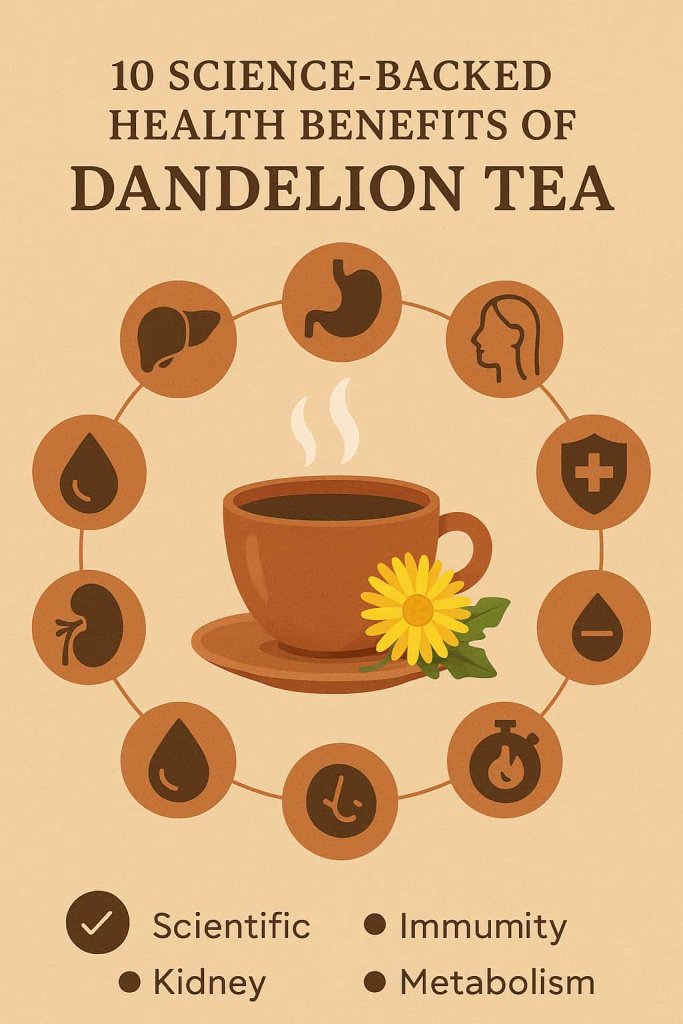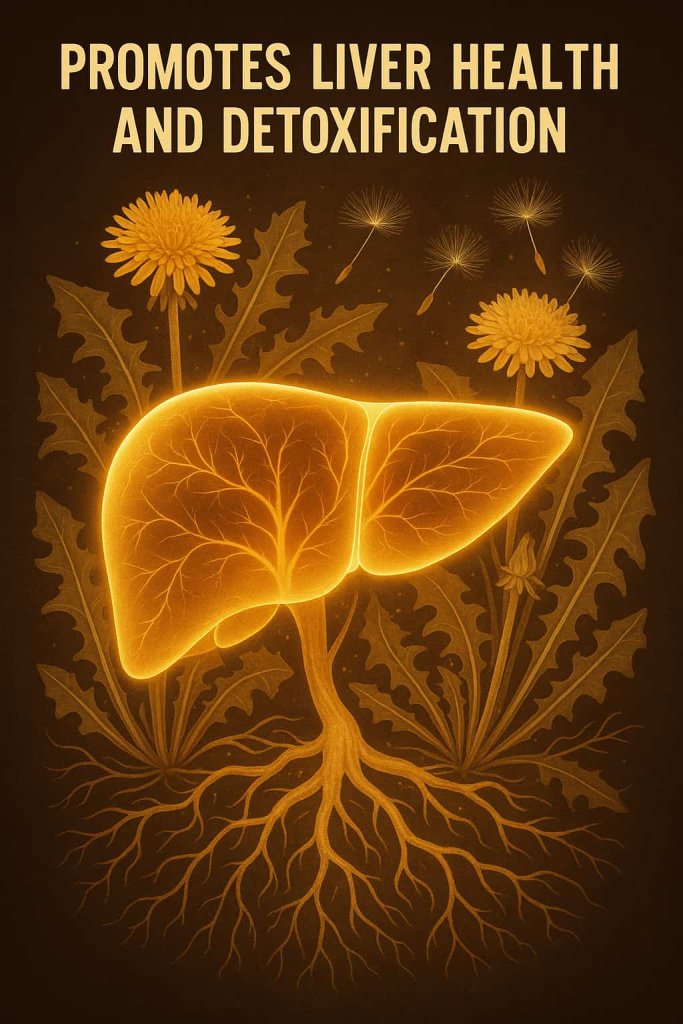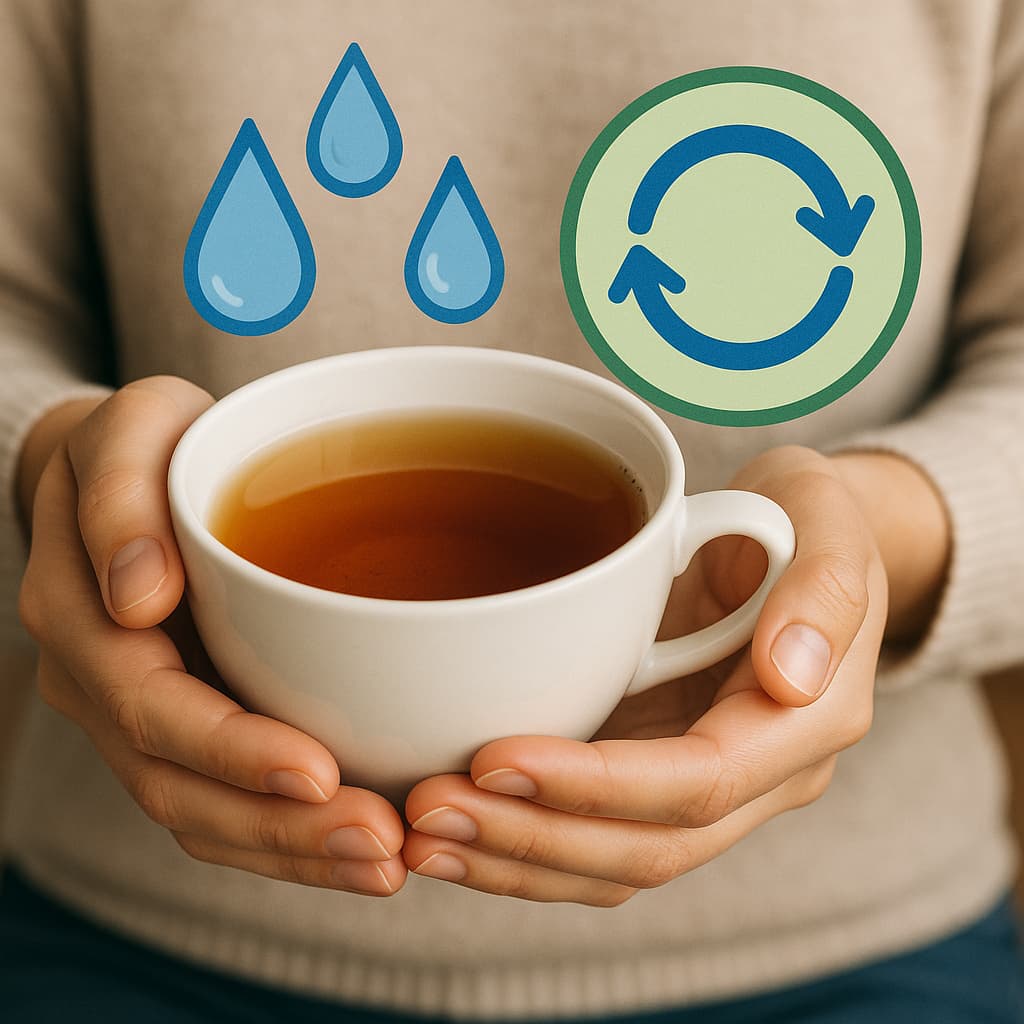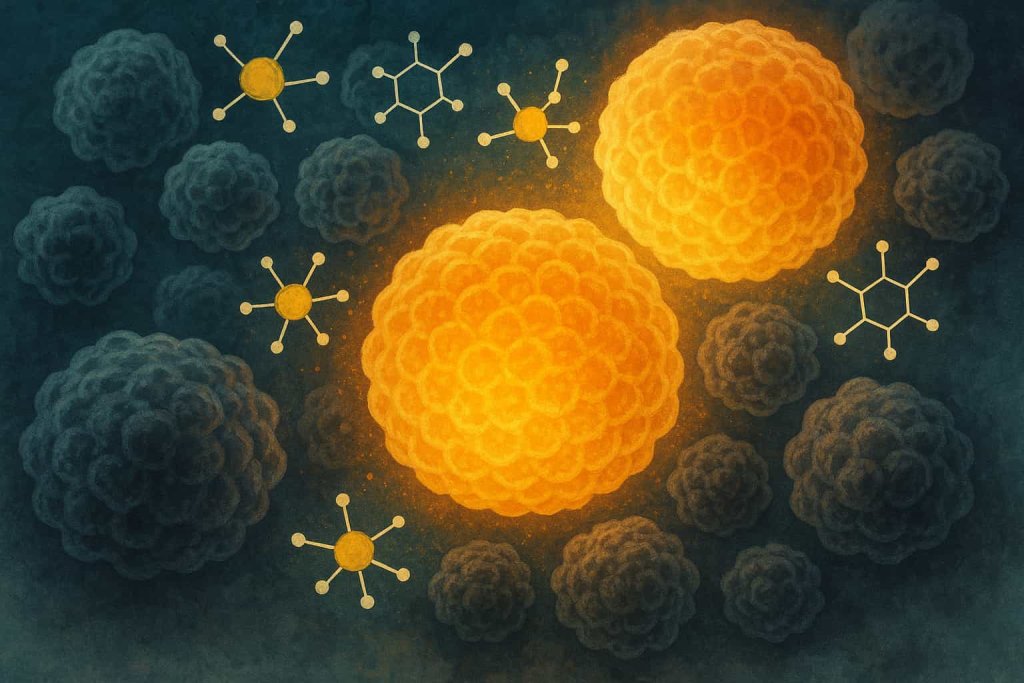Dandelion tea offers powerful health benefits for your liver, digestion, and skin — all backed by science.
Made from the roots, leaves, or flowers of the Taraxacum officinale plant, this humble herbal tea is far more than a garden weed remedy. It’s a natural source of antioxidants, vitamins, and minerals that help cleanse your body, balance fluids, and support overall wellness.

Understanding the benefits of dandelion tea is important because it plays a vital role in liver detoxification, digestive balance, immune strength, and heart health — all without caffeine.
Whether you’re looking to boost your metabolism, reduce bloating, or simply enjoy a refreshing herbal tea, dandelion tea can be a gentle and effective addition to your daily wellness routine.
In this guide, you’ll discover 10 amazing, science-backed benefits of dandelion tea, along with its nutritional profile, safe dosage guidelines, best brewing methods, and expert-recommended tips to help you get the most out of this detoxifying herbal drink.
🌿 Backed by modern research and traditional herbal wisdom, dandelion tea proves that nature’s simplest plants often hold the most powerful health secrets.
What Is Dandelion Tea?
Dandelion tea is made from the leaves, roots, or flowers of the Taraxacum officinale plant — the common dandelion.
While often considered a weed, this plant is packed with vitamins A, C, and K, minerals like iron, potassium, and calcium, and bioactive compounds such as flavonoids (luteolin, quercetin) and phenolic acids (chicoric and caffeic acids).
There are three main types of dandelion tea:
- Leaf tea: Mild and diuretic; supports water balance.
- Root tea: Rich and earthy; supports liver detox.
- Flower tea: Light and floral; rich in antioxidants.
Nutritional Profile of Dandelion Tea
Dandelion tea isn’t just a detox drink — it’s a nutrient powerhouse packed with vitamins, minerals, and antioxidants that support your liver, skin, and immune system.
According to the U.S. Department of Agriculture (USDA) and Healthline, both the leaves and roots of Taraxacum officinale contain a rich blend of micronutrients and bioactive compounds that explain many of its health benefits.
Here’s a look at what’s inside one cup (240 ml) of freshly brewed dandelion root tea:
| Nutrient | Approx. Amount per Cup (240 ml) | Health Benefit |
|---|---|---|
| Vitamin A | 112% DV | Supports healthy vision, skin renewal, and immunity |
| Vitamin C | 32% DV | Boosts immune response and promotes collagen formation |
| Vitamin K | 25% DV | Helps with bone strength and cardiovascular protection |
| Calcium | 50 mg | Essential for strong bones and teeth |
| Potassium | 218 mg | Regulates blood pressure and fluid balance |
| Iron | 0.9 mg | Aids oxygen transport and energy production |
| Magnesium | 20 mg | Supports nerve function and muscle relaxation |
| Inulin (prebiotic fiber) | 1.5 g | Promotes healthy gut bacteria and digestion |
| Polyphenols (Luteolin, Chicoric Acid, Quercetin) | Trace | Provide antioxidant and anti-inflammatory effects |
Key Bioactive Compounds in Dandelion Tea
- Luteolin: A flavonoid with strong antioxidant and anti-inflammatory activity, linked to heart and brain health.
- Chicoric Acid: Known to enhance glucose metabolism and protect liver cells from oxidative damage.
- Quercetin: Helps regulate inflammation and supports immune defense.
- Sesquiterpene Lactones: Bitter compounds that stimulate bile production and aid detoxification.
These phytochemicals work synergistically to make dandelion tea both nourishing and therapeutic, offering gentle support to your liver, digestion, and overall wellness.
☕ Pro Tip: For the highest nutrient retention, steep dried dandelion roots or leaves for at least 10–15 minutes in hot (not boiling) water and cover the cup to preserve volatile antioxidants.

Why Dandelion Tea Matters for Your Health
Dandelion tea acts as a natural detoxifier and anti-inflammatory tonic, helping your body process toxins, regulate digestion, and maintain healthy hydration.
It’s often used as a natural alternative to coffee, especially dandelion root tea, which has a roasted flavor and supports liver and gut health.
Here’s why health experts are giving it renewed attention:
- Supports liver function
- Promotes healthy digestion
- Helps regulate fluid balance
- Rich in antioxidants
- May help control blood sugar and cholesterol
10 Science-Backed Health Benefits of Dandelion Tea
Herbalists have praised dandelion tea for centuries, and now research is catching up with tradition. Modern studies reveal that this humble plant supports liver detox, digestion, immunity, heart health, and even healthy skin — all through its unique mix of antioxidants, vitamins, and minerals.
Here’s what science says about each benefit.
1. Promotes Liver Health and Detoxification

Dandelion root tea is often called a natural liver tonic. It stimulates bile production — a digestive fluid made by the liver — which helps break down fats and flush toxins from the body.
According to research published in the National Library of Medicine (2022), compounds in Taraxacum officinale may protect the liver from oxidative stress and chemical damage. In animal models, dandelion extract improved liver enzyme levels and reduced fatty buildup in the liver, suggesting hepatoprotective effects.
The tea’s natural antioxidants, such as chicoric acid and luteolin, further help neutralize free radicals, which supports long-term liver function.
💡 Tip: Drink one cup of roasted dandelion root tea in the morning to gently support your liver’s daily detox process.
2. Supports Healthy Digestion

One of the best-known benefits of dandelion tea is its role in promoting digestive health.
The root is rich in inulin, a type of prebiotic fiber that nourishes beneficial gut bacteria. A healthy gut microbiome can improve digestion, reduce bloating, and enhance nutrient absorption.
As noted by Healthline (2024), inulin may also help relieve mild constipation and support regular bowel movements. Additionally, dandelion tea naturally stimulates the production of stomach acid and bile — making it especially helpful after a heavy meal.
For best results, drink a warm cup 20–30 minutes before eating to encourage smoother digestion.
3. Acts as a Natural Diuretic

Feeling bloated or retaining excess water? Dandelion leaf tea may offer a natural solution.
Research published in the Journal of Alternative and Complementary Medicine (2009) found that dandelion leaf extract significantly increased urinary frequency and output in human participants — without causing potassium loss, a common issue with many synthetic diuretics.
This natural diuretic effect helps the body release excess sodium and fluids, which can reduce bloating, puffiness, and mild water retention. It’s especially helpful for those experiencing temporary swelling from hormonal changes, high-sodium diets, or sedentary periods.
Because dandelion supports healthy kidney function and fluid balance, it may also complement management of mild hypertension or edema — but always under a doctor’s supervision.
Unlike prescription diuretics, dandelion’s potassium content helps prevent electrolyte imbalance, making it a gentler, plant-based alternative for maintaining hydration and detoxification.
⚕️ Important: People taking prescription diuretics or medications affecting kidney function should consult a healthcare provider before adding dandelion tea to their daily routine
4. Helps Regulate Blood Sugar Levels

Emerging research shows that dandelion tea may help maintain balanced blood sugar.
Active compounds like chicoric acid and chlorogenic acid appear to enhance insulin sensitivity and reduce glucose spikes after meals.
A review published in PubMed Central (PMC, 2022) found that dandelion extracts improved glucose tolerance and lipid metabolism in diabetic animal models. While human trials are limited, these results suggest that regular dandelion tea may complement a balanced diet for people with prediabetes.
Note: Always consult your healthcare provider if you’re taking diabetes medications, as herbal teas may alter blood sugar levels.
5. May Lower Cholesterol and Support Heart Health

Dandelion tea’s antioxidants don’t just benefit the liver — they protect your heart, too.
Research highlighted by Medical News Today (2023) suggests that dandelion’s polyphenols can reduce total cholesterol, lower LDL (“bad”) cholesterol, and raise HDL (“good”) cholesterol.
Its anti-inflammatory and antioxidant properties help prevent plaque formation in arteries and reduce oxidative damage — both key contributors to cardiovascular disease. Regularly drinking dandelion root tea may thus help promote better blood flow and heart function.
6. Supports Healthy Skin and Anti-Aging

Dandelion is packed with vitamins A and C, which are essential for collagen production, cell regeneration, and youthful skin.
According to a 2021 study published in Oxidative Medicine and Cellular Longevity, dandelion extracts may protect skin cells from UV damage and oxidative stress.
This natural defense helps reduce fine lines, acne, and dullness. When consumed regularly, dandelion tea supports detoxification from the inside out — leading to clearer, glowing skin.
For an extra glow, pair dandelion tea with hydrating foods like cucumber or lemon water.
7. Strengthens the Immune System

Dandelion tea is rich in flavonoids and polyphenols that exhibit antimicrobial and antiviral properties.
A review on WebMD (2024) notes that dandelion extracts can help the body fight off bacteria and boost immune cell activity.
Its antioxidant effects also reduce chronic inflammation, which can otherwise suppress immunity. Herbalists often recommend it as part of a seasonal detox to strengthen the immune system, particularly during cold and flu seasons.
8. Aids in Weight Management

If you’re looking for a gentle, natural metabolism boost, dandelion tea can be an excellent addition.
Because it acts as a mild diuretic and digestive enhancer, it helps reduce water retention and bloating — often mistaken for fat gain.
Interestingly, a Healthline (2023) review cites studies showing that dandelion extract may inhibit pancreatic lipase, an enzyme involved in fat absorption — similar to the mechanism of the prescription weight-loss drug Orlistat.
While results vary, combining dandelion tea with a healthy diet and exercise may support healthy body composition.
9. Helps Fight Inflammation

Chronic inflammation is a root cause of many diseases, from arthritis to digestive issues.
The chicoric acid and luteolin found in dandelion tea show strong anti-inflammatory activity in both cell and animal studies.
Research in PubMed Central (2020) found that dandelion extract decreased inflammatory cytokines and oxidative stress markers, potentially alleviating symptoms of conditions like IBS, arthritis, and metabolic syndrome.
Drinking 1–2 cups daily can help your body maintain a healthier inflammatory balance over time.
10. May Have Anti-Cancer Properties

Among the most promising — yet still early — findings on dandelion root extract is its potential role in cancer research.
Laboratory studies conducted by the Memorial Sloan Kettering Cancer Center (MSKCC, 2023) indicate that dandelion compounds can trigger apoptosis (programmed cell death) in certain cancer cell lines, including leukemia, breast, and colorectal cancers.
However, experts emphasize that these are preclinical results. Dandelion tea should never replace medical treatment, but rather be viewed as a complementary wellness beverage that supports overall cellular health through its high antioxidant content.
Best Natural Ways to Enjoy Dandelion Tea
Knowing how to drink dandelion tea properly helps you unlock its full detoxifying and digestive potential. Whether you prefer the earthy richness of roasted roots or the light freshness of leaves, each type offers unique benefits — and the right brewing method makes all the difference.
1. Choose Your Dandelion Type
There are three main ways to brew this herbal powerhouse, depending on your wellness goals:
| Type | Flavor Profile | Best For |
|---|---|---|
| Root Tea | Rich, nutty, slightly bitter | Liver detox, digestion, and metabolism |
| Leaf Tea | Light, grassy, mildly sweet | Water balance, kidney and heart support |
| Flower Tea | Soft and floral | Skin health, relaxation, and antioxidant support |
According to Healthline, the root version is most effective for liver and digestive benefits, while the leaf tea acts as a natural diuretic.
2. Brewing Method (Root vs. Leaf)
For Dandelion Root Tea:
- Add 1–2 teaspoons of dried or roasted dandelion root to a cup (240 ml) of hot water.
- Cover and steep for 10–15 minutes to extract nutrients and bitter compounds.
- Strain and enjoy warm.
For Dandelion Leaf Tea:
- Add 1 teaspoon of dried leaves to a cup of hot water.
- Steep for 5–10 minutes only — the flavor is more delicate.
- Optionally, combine with green tea or chamomile for a balanced blend.
💡 Tip: Cover your cup while steeping to preserve the volatile antioxidants and essential oils that provide the tea’s therapeutic effects.
3. Enhance with Natural Add-Ins
Enhance both taste and health benefits with simple, natural add-ons:
- Lemon: Boosts vitamin C and enhances detox effects.
- Honey: Adds sweetness and soothes digestion (use raw honey for extra enzymes).
- Fresh Ginger: Supports circulation and boosts anti-inflammatory properties.
- Cinnamon or Turmeric: Adds warmth and extra antioxidant power.
- Mint or Chamomile: Calms the stomach and balances bitterness.
Combine dandelion with ginger and lemon for a refreshing morning detox infusion — a combination widely recommended in natural wellness blogs and Medical News Today.
4. Best Time to Drink Dandelion Tea
Timing your tea right helps maximize its benefits:
| Time of Day | Purpose |
|---|---|
| Morning (empty stomach) | Detox and liver stimulation |
| Before meals | Boosts digestion and bile flow |
| Afternoon | Natural energy lift without caffeine |
| Evening (1–2 hrs before bed) | Gentle digestive cleanse and hydration |
Avoid drinking it right before bedtime if you’re sensitive to its mild diuretic effect.
5. Storage and Freshness Tips
To keep your dandelion tea potent and flavorful:
- Store dried roots or leaves in an airtight glass jar away from sunlight.
- Keep in a cool, dry place (not in the fridge).
- For best results, use within 6–9 months of purchase.
- If making tea in batches, refrigerate brewed tea and consume within 48 hours.
For optimal freshness, buy organic dandelion tea from trusted brands like Traditional Medicinals, Yogi Tea, or Frontier Co-op, which source high-quality, pesticide-free herbs.
Quick Recipe: Dandelion Detox Elixir
Ingredients:
- 1 cup dandelion root tea
- 1 teaspoon fresh lemon juice
- ½ teaspoon honey
- 1 slice fresh ginger
Instructions:
Steep tea for 10–15 minutes, strain, mix with lemon and honey, add ginger slice, and enjoy warm.
This soothing elixir supports gentle liver detox and digestive comfort.
✅ Final Tip
Consistency is key. Drinking 1–2 cups daily of freshly brewed dandelion tea — especially in the morning — helps maintain your body’s natural detox rhythm, keeps digestion smooth, and supports long-term wellness naturally.
Recommended Daily Intake, Safety & Side Effects
Although dandelion tea is a natural and caffeine-free beverage, it still contains potent bioactive compounds that affect your liver, kidneys, and digestion.
Drinking it in the right amount ensures you enjoy its benefits without side effects.
According to WebMD and Mayo Clinic, moderate consumption — 1 to 3 cups per day — is considered safe for most adults.
Recommended Daily Intake Chart
| Type of Dandelion Tea | Ideal Daily Amount | Primary Benefit | Notes |
|---|---|---|---|
| Root Tea (Roasted or Dried) | 1 cup/day | Supports liver detox & digestion | Richer flavor, stronger detox effect |
| Leaf Tea | 1–3 cups/day | Promotes kidney and heart health | Mild diuretic; ideal for bloating relief |
| Flower Tea | 1–2 cups/day | Skin health & relaxation | Gentle antioxidant beverage |
| Blended Herbal Mix (e.g., dandelion + ginger) | Up to 2 cups/day | Balanced detox & digestion | Ensure ingredients are caffeine-free |
💡 Tip: Start with one cup daily for a week to check tolerance, especially if you have sensitive digestion or are taking medications.
Medical Cautions and Possible Side Effects
While dandelion tea is safe for most people, excessive intake or allergies can cause mild reactions.
Common side effects may include:
- Stomach discomfort or mild diarrhea
- Increased urination (diuretic effect)
- Heartburn or acid reflux (from high bile stimulation)
- Allergic skin reaction (especially in those allergic to daisies, ragweed, or marigolds)
If any discomfort occurs, reduce the amount or discontinue use temporarily.
The National Center for Complementary and Integrative Health (NCCIH) advises consuming herbal teas like dandelion in moderation and consulting a healthcare professional if you have underlying health conditions.
Drug Interactions
Dandelion tea can interact with several prescription medications due to its natural diuretic and liver-activating effects.
As highlighted by Mayo Clinic, possible interactions include:
| Medication Type | Potential Effect |
|---|---|
| Diuretics (water pills) | May enhance fluid loss and cause dehydration or low potassium |
| Blood Thinners (Warfarin, Aspirin) | May increase bleeding risk due to vitamin K content |
| Lithium | May affect lithium concentration in the body due to increased urination |
| Antibiotics (Ciprofloxacin) | May reduce antibiotic absorption |
| Diabetes Medications (Metformin, Insulin) | May lower blood sugar further — monitor closely |
⚠️ Always speak with your doctor or pharmacist before adding dandelion tea if you’re on any long-term medication, including over-the-counter supplements.
Pregnancy and Breastfeeding Advice
According to WebMD, there isn’t enough reliable clinical data on the safety of dandelion tea during pregnancy or breastfeeding.
While occasional consumption is unlikely to be harmful, it’s best to:
- Limit to ½–1 cup per day, only if approved by your healthcare provider.
- Avoid concentrated extracts or detox blends.
- Monitor for allergic or diuretic effects.
- Choose organic, pesticide-free tea to avoid contaminants.
For pregnant individuals, herbal teas like ginger or chamomile are often preferred under supervision, as they have more established safety data.
Who Should Avoid Dandelion Tea
Avoid or limit consumption if you:
- Have kidney disease, gallstones, or bile duct obstruction.
- Are on prescription diuretics, anticoagulants, or antidiabetic medication.
- Have known allergies to plants in the Asteraceae (daisy) family.
For anyone with chronic health issues, it’s best to consult a doctor or herbalist before adding dandelion tea to your routine.
Safe Consumption Summary
| Population Group | Recommended Amount | Safety Notes |
|---|---|---|
| Healthy Adults | 1–3 cups/day | Generally safe and beneficial |
| Pregnant/Breastfeeding | ≤1 cup/day | Consult healthcare provider first |
| People with Liver/Kidney Disorders | Limit or avoid | May alter enzyme function |
| Children | Not recommended without pediatric advice | Limited safety data |
✅ Bottom Line:
When consumed responsibly, 1–3 cups of dandelion tea per day can be a safe, nourishing addition to your wellness routine. Always check for allergies and medication interactions to ensure it complements — not complicates — your health plan.
Frequently Asked Questions (FAQ)
1. Can I drink dandelion tea every day?
Yes — according to Healthline, most people can safely drink 1 to 3 cups of dandelion tea daily.
Regular use may help support liver detox, digestion, and hydration.
However, because it has mild diuretic properties, avoid drinking too much in one sitting or late at night. If you take prescription diuretics or blood thinners, consult your doctor before daily use.
💡 Tip: Start with one cup a day and gradually increase to see how your body responds.
2. Does dandelion tea really detox the liver?
Yes — evidence suggests that dandelion root tea may support natural liver detoxification by increasing bile flow and protecting liver cells from oxidative stress.
Animal studies published in PubMed Central (PMC, 2022) found that dandelion extract improved liver enzyme levels and reduced fat accumulation in the liver.
While more human studies are needed, it’s considered a safe, natural beverage that complements the liver’s own detox processes — not a replacement for medical detox programs.
3. Does dandelion tea help with acne or skin health?
Yes — thanks to its high content of vitamin C, vitamin A, and polyphenols, dandelion tea may help improve skin clarity and elasticity.
Research in Oxidative Medicine and Cellular Longevity (2021) found that dandelion extract protects skin cells from UV damage and oxidative stress, both major contributors to acne and premature aging.
According to Medical News Today, its natural detox and anti-inflammatory effects can also reduce skin flare-ups caused by toxins and stress.
For glowing skin, combine dandelion tea with plenty of water and antioxidant-rich foods like berries or green vegetables.
4. Is dandelion tea safe for diabetics or people with high blood sugar?
In moderation, yes — and it may even help.
Dandelion contains chicoric acid and chlorogenic acid, compounds shown in Healthline’s 2024 review to improve insulin sensitivity and help regulate blood sugar levels.
However, if you’re on diabetes medications such as insulin or metformin, dandelion tea could potentially lower your blood sugar further.
Always monitor your glucose closely and talk to your doctor before including it in your daily routine.
5. Is dandelion tea safe during pregnancy or breastfeeding?
There isn’t enough clinical research to confirm safety during pregnancy or breastfeeding.
WebMD notes that dandelion tea should be used with caution, as it may act as a mild diuretic and stimulate bile flow.
If you’re pregnant or nursing:
- Limit to ½–1 cup daily, only with doctor approval.
- Choose organic, pesticide-free dandelion tea.
- Avoid concentrated extracts or detox blends.
For safer alternatives, consider gentle herbal teas like chamomile or ginger under healthcare supervision.
6. What’s the best time to drink dandelion tea?
The morning is generally the best time to drink dandelion tea — it gently supports liver detox and kick-starts your metabolism.
Drinking a cup 20–30 minutes before meals can also enhance digestion and reduce bloating.
Avoid drinking it late in the evening, as its mild diuretic effect may interrupt sleep due to increased urination.
| Time of Day | Recommended Purpose |
|---|---|
| Morning (empty stomach) | Liver and kidney detox |
| Before lunch or dinner | Aids digestion |
| Afternoon | Gentle energy boost |
| Evening | Avoid if prone to nighttime urination |
7. Can dandelion tea interact with medications?
Yes — dandelion tea can interact with diuretics, anticoagulants, lithium, and diabetes medications, according to Mayo Clinic.
These interactions may increase urine output, affect drug absorption, or alter potassium and blood sugar levels.
Always talk to your healthcare provider before adding dandelion tea if you take any prescription or over-the-counter medications.
✅ In summary:
Dandelion tea is a safe, nutrient-rich herbal beverage when consumed moderately.
It supports detox, skin health, and blood sugar balance, but should be used with medical guidance if you’re pregnant or taking medications.
Conclusion
Dandelion tea is more than just a herbal drink — it’s a powerful, science-backed wellness booster that naturally supports your liver, digestion, skin, heart, and immune system.
Packed with vitamins, minerals, and antioxidants, this humble plant works gently with your body to flush out toxins, balance fluids, and promote long-term vitality.
Whether you drink it for detox, digestion, or daily hydration, adding dandelion tea to your wellness routine can make a real difference in how you feel and function.
It’s a simple, affordable, and caffeine-free way to promote whole-body balance — from the inside out.
🌿 Start your morning with a soothing cup of dandelion tea and experience its science-backed benefits for natural detox, clearer skin, and renewed energy.
Your body — and your health — will thank you. 💚
References
- Healthline – Dandelion: Potential Health Benefits & Side Effects (2025)
Comprehensive summary of dandelion’s proven and potential benefits — including liver detox, digestion, inflammation, and skin health. - PubMed Central (NIH) – Pharmacological Effects of Taraxacum officinale (2022)
Scientific review highlighting antioxidant, anti-inflammatory, and hepatoprotective activities of dandelion compounds. - Medical News Today – Dandelion: Health Benefits, Research, and Side Effects
Accessible evidence-based article summarizing dandelion’s nutritional composition, health uses, and safety precautions. - WebMD – Dandelion Tea: Is It Good for You?
Provides practical details on dandelion tea’s diuretic effects, potential interactions, and dosage guidance. - USDA FoodData Central – Dandelion Greens Nutrition Facts
Official nutrient database for vitamin, mineral, and fiber values — supports your nutritional profile table.
